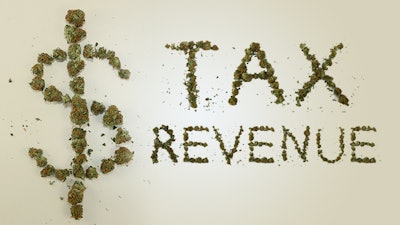
Colorado and Washington cannabis tax collections have exceeded initial estimates, and a mature industry could generate $28 billion nationwide in tax revenues, according to two new studies.
The Tax Foundation, an independent tax policy research organization, released “Marijuana Legalization and Taxes: Federal Revenue Impact” and “Marijuana Legalization and Taxes: Lessons for Other States from Colorado and Washington” May 12. The reports cover the effects of legalization and tax structures within the cannabis industry.
Some key findings include:
-A mature marijuana industry could generate up to $28 billion in tax revenues for federal, state and local governments, including $7 billion in federal revenue: $5.5 billion from business taxes and $1.5 billion from income and payroll taxes.
-A 10 percent sales surtax could generate $5.3 billion per year.
-The reduction of societal risk in being engaged in the marijuana trade, as well as the inclusion of taxes, will combine to reduce profits (and tax collections) somewhat from an initial level after national legalization.
-Colorado, Washington and Oregon have all taken steps to reduce their marijuana tax rates, with Alaska considering it, after initial rates of 30 percent or more did not reduce the black market sufficiently.
-Significant attention must be given to health, agricultural, zoning local enforcement and criminal penalty issues. These important issues have generally been unaddressed in ballot initiatives and left for resolution in the implementation process.
-The highest tax on recreational marijuana in the U.S. is 37 percent in Washington, followed by Colorado at 29 percent.
“Federal Revenue Impact” references the slow start for both Colorado, originally underperforming the 2014 estimation of $70 million in marijuana tax collections. Current state collections will likely exceed $140 million for calendar year 2016, according to the report.
It also outlines options for taxes on the industry, including a federal excise tax similar to taxes on gasoline or alcohol, but specifically relative to cigarettes. With an excise tax of $23 per pound of product, the tax would raise approximately $500 million in additional revenue. Business income would initially raise more federal revenue, but as more players enter the market, that total would fall.
“Lessons for Other States from Colorado and Washington” compares tax rates among current legal states alongside states with ballot or legislative proposals. Though Colorado’s tax rate is currently 29, in July of 2017, it will drop to 27 percent. Recent ballot initiatives propose between 10 and 25 percent. Higher tax rates are less effective at eliminating the state’s black market, according to the report.
It also covers how federal law limits state efforts on taxation of cannabis, starting with cannabis’s placement as a Schedule I drug. Tax law also singles out legal marijuana businesses with a higher income tax burden.
The reports are available at the links below:
Marijuana Legalization and Taxes: Federal Revenue Impact
Marijuana Legalization and Taxes: Lessons for Other States from Colorado and Washington

























